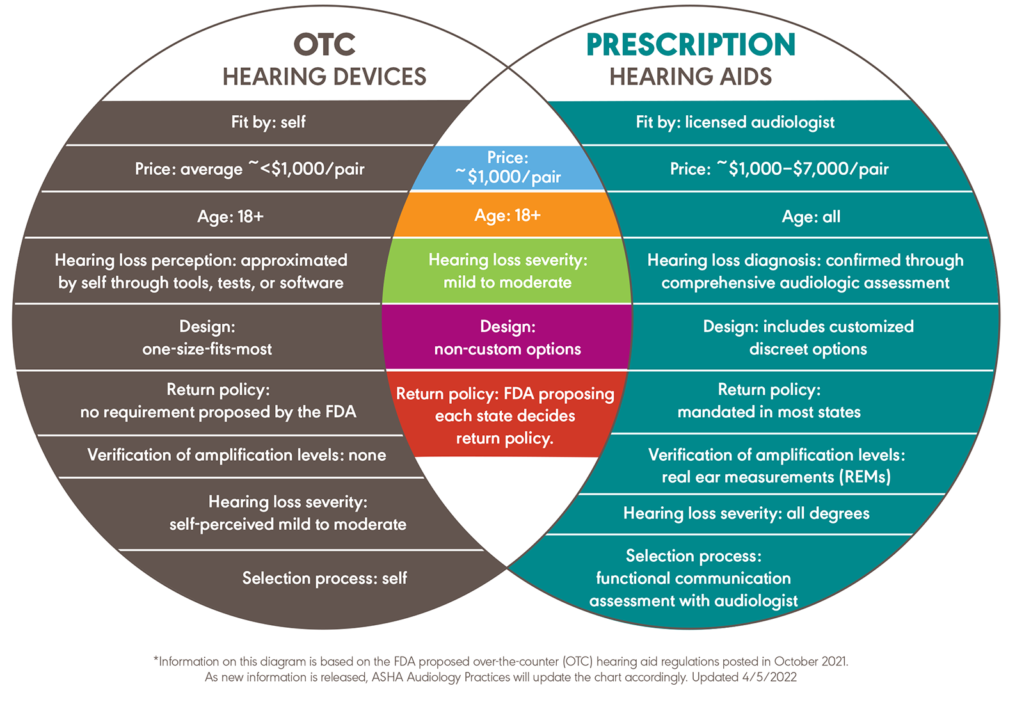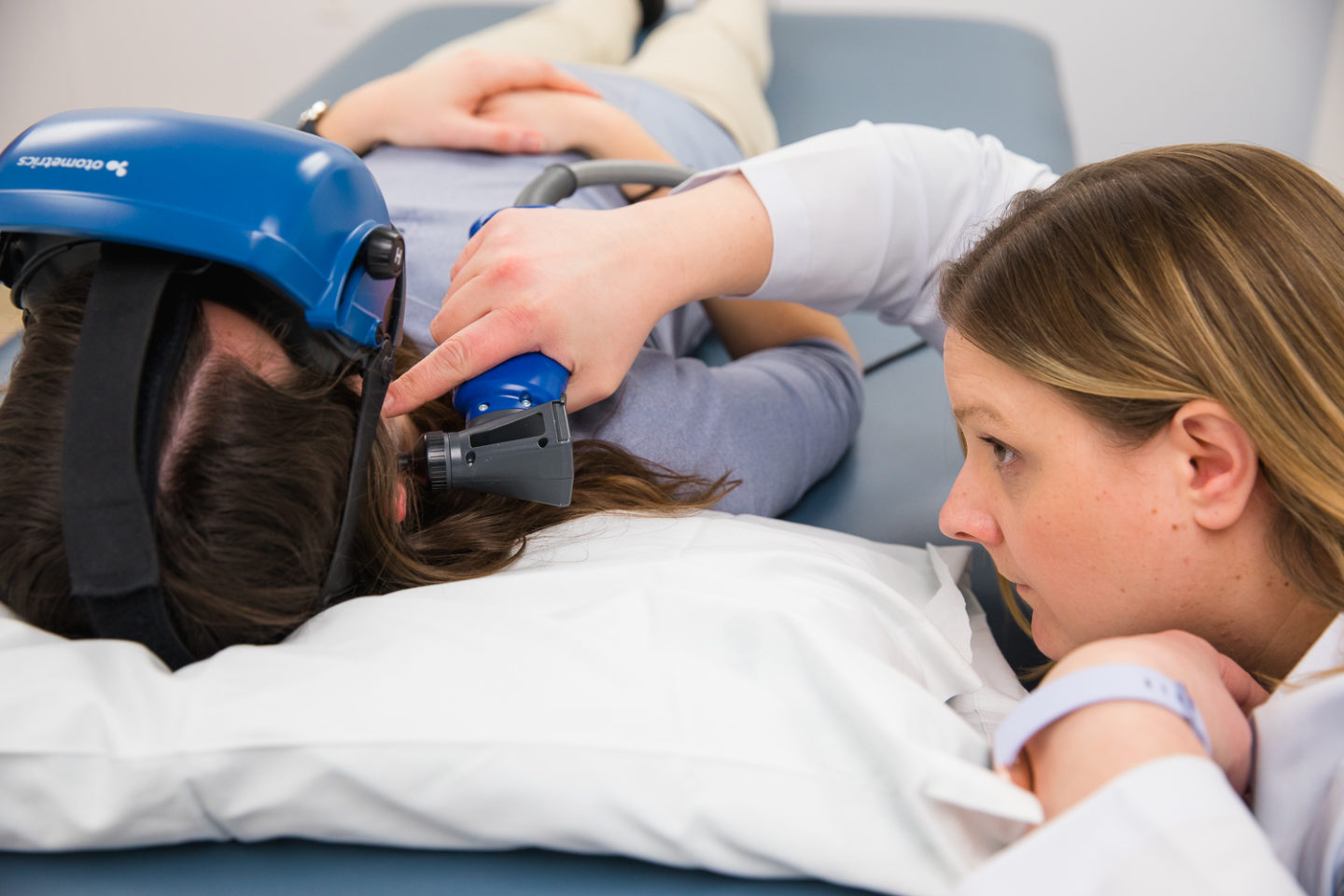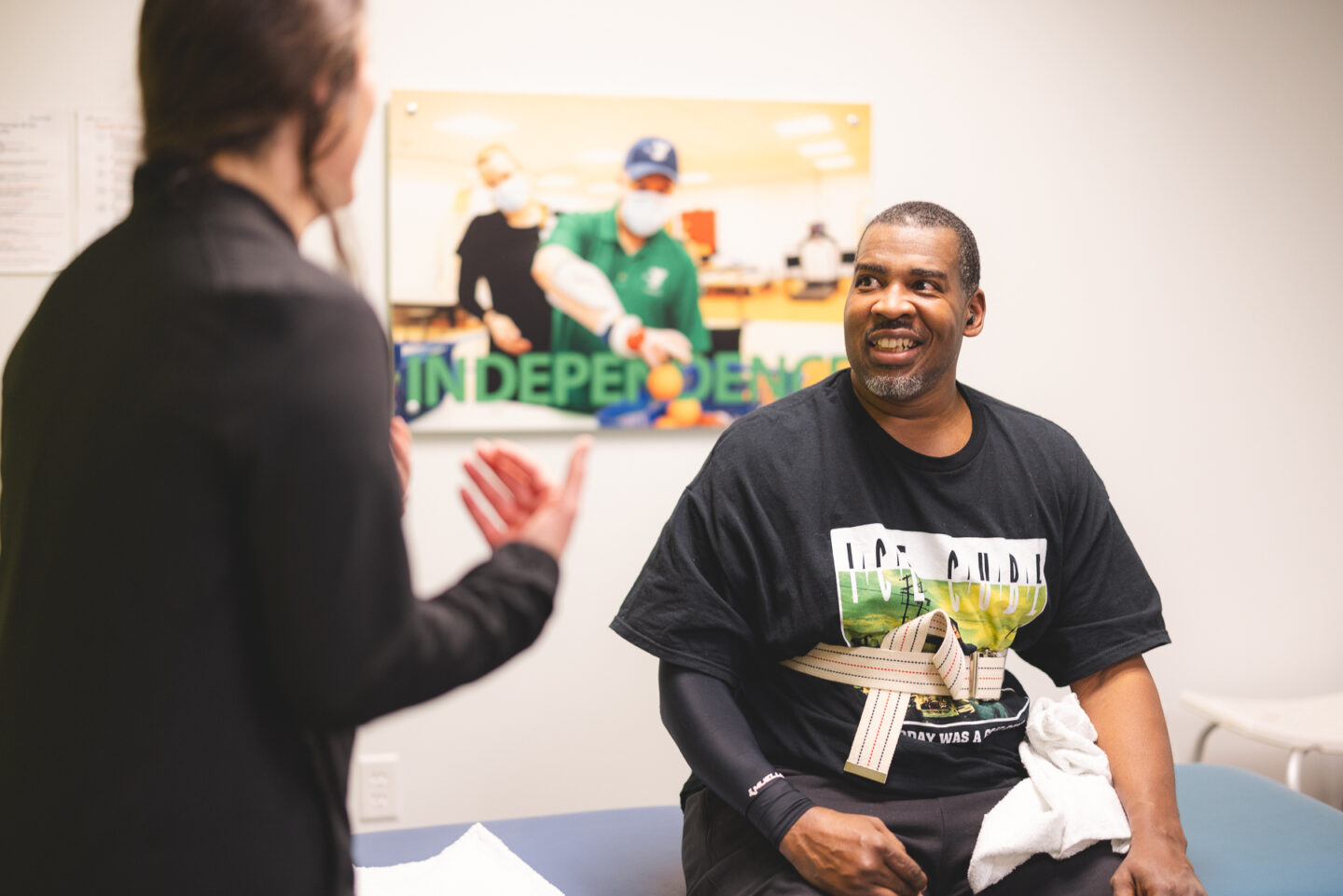Posted on November 8, 2022
Over-the-Counter Hearing Aids: Tips from an Audiologist
Are the new over-the-counter hearing aids right for you? Read on for some helpful answers to today’s commonly asked questions.
The FDA recently made some types of hearing aids available for purchase over the counter (OTC). That’s great news for millions of Americans with mild to moderate hearing loss. Now they can buy hearing aids at the store or online without a prescription.
What should you consider when buying a hearing new device? If you, a family member or friend are experiencing hearing loss, you may be researching your options. To answer some of our questions, our resident expert Emily Brandner, Au.D., CCC-A, an audiologist at Mary Free Bed, helped explain.
What is an audiologist?
Audiologists are doctoral-level professionals. They’re trained to evaluate hearing, diagnose hearing loss, and help optimize hearing health.
Audiologists are highly knowledgeable resources who promote safe and effective use of all types hearing aids, including those available over the counter.
How can someone lose their hearing?
People can lose their hearing from noise exposure or aging. Genetics and certain syndromes can also cause hearing loss. Diabetes can also put people at a higher risk of losing hearing, along with some medications like chemotherapy or some strong antibiotics.
Who is a good candidate for OTC hearing aids?
OTC hearing aids are approved for use only in adults 18 years of age and older who have mild to moderate hearing loss.
A hearing test is not required for OTC devices, however it is advised that you receive a hearing test from an audiologist to determine what’s best for you.
If you’re having some difficulty with clarity of speech or could use just a boost in volume, an OTC device might be a good start for you. Think of them like ‘reading glasses’ for your ears. – Dr. Emily Brandner, Mary Free Bed audiologist.
Who should not use OTC hearing aids?
Always get a professional opinion first if you are experiencing:
-
- A difference in hearing ability between your ears.
- A sudden drop in one or both of your ears.
- Tinnitus or dizziness; it should be evaluated to rule out a medical cause.
- Pain, pressure, drainage or wax build up in the ears.
- Children cannot use over-the-counter hearing aids. They have frequently changing needs due to growing bodies and high demands on their hearing to learn. Michigan children can qualify for hearing loss services through a State of Michigan program that can provide hearing aids for you.
- People with moderate to greater hearing loss should see a doctor for a device. The OTC hearing aids will only help for those with mild to moderate hearing issues.
- Anyone with dexterity issues using hearing aids, like changing the batteries or placing them in your ears. You would benefit from a personalized level of care that you’d received from an audiologist.
What are the differences between hearing devices?
Let’s take a look at the different types of hearing devices available today:
_________________________________
Amplifiers are an entry-level device with minimal flexibility. They combine headphones with a separate handheld device. These are a good option for someone with limited dexterity or only need it for one-on-one conversations. A personal sound amplifier, or PSAP would fall into this category.
_________________________________
Hearables are devices that weren’t designed as amplifiers or hearing aids, but can but used for a little hearing boost. They are a specialized type of headset and earbud that fall into this category because they have volume control and a mode to help you hear in your environment more clearly. They aren’t designed to be used for a full day’s worth of communication.
_________________________________
Over-the-Counter (OTC) Hearing Aids look more like a traditional prescription hearing aid. However, the OTC hearing aids are a different type of device from the hearing aids available from an audiologist. OTC hearing aids might use a smart phone app to have the user take a hearing screening to match the amplification to their hearing loss. Some of the devices can be paired with a phone to stream phone calls or music, too. Best for people who have:
-
- No complex ear conditions
- Self-perceived mild amounts of hearing loss
- Good dexterity
- The ability to manage the device independently
_________________________________
Prescription Hearing Aids are prescribed by a medical professional. They are the most customizable and programmable option designed to meet your individual needs. They will be able to make the adjustments to fit your hearing and comfort level. Doctors can also fit individuals with devices like cochlear implants or bone-anchored hearing aids. Best for people who need:
-
- Full-range options
- Discreet and custom-fit designs
- Testing using advanced testing and diagnostic tools
- Devices for any age and medical status
What to know when buying over-the-counter hearing aids
OTC hearing aids are still an investment – shop wisely. OTC hearing aids range between $700 – $1,200 a pair, while prescription hearing aids range from $1,000 to $7,000.
Purchase OTC hearing aids from a reputable company. Consider their customer support you’ll have available – both online and over the phone. It’s always nice to have someone who can help you navigate this type of purchase.
Helpful questions to ask when buying an OTC hearing aid:
-
- Will this device provide enough volume for my needs?
- Do I have any allergies to the materials it’s made of? i.e. Latex?
- Can I physically insert and remove the hearing aid on my own?
- Does it come in different size ear pieces?
- Can I remove the battery, or is it rechargeable?
- What cleaning and maintenance required?
Be sure to double check the return policy. In Michigan, you have 30 days minimum to return prescription devices, but the federal government current does not mandate timelines or policies for OTC returns. What if something stops working or the device breaks? Ask about the warranty and if replacement parts are readily available.
Ask For Mary: Audiology & Hearing Aid Services
Can I get a hearing test at Mary Free Bed?
Yes! You can Ask For Mary. Mary Free Bed offers hearing tests as well as balance testing. Our certified audiologists and experts use advanced tools to provide a clear diagnosis. They can help you determine whether an OTC hearing aid is right for you, or if a prescription hearing aid will be more beneficial.
If you would like an audiology or vestibular evaluation, you can call 616.840.8005 or schedule an appointment here.
MORE RESOURCES
Emily Brandner was recently interviewed by local media sharing tips about hearing aids. Check out these stories for more great advice:
- WGVU Radio’s The Morning Show with Shelley Irwin
- WXMI FOX 17
The American Academy of Audiology offers a user-friendly guide for consumers. It includes info for devices for children and an extensive Frequently Asked Questions section.
The American Speech-Language-Hearing Association has a very helpful OTC hearing aid toolkit. Included on the ASHA website is this handy, quick comparison of OTC hearing devices and prescription hearing devices:







